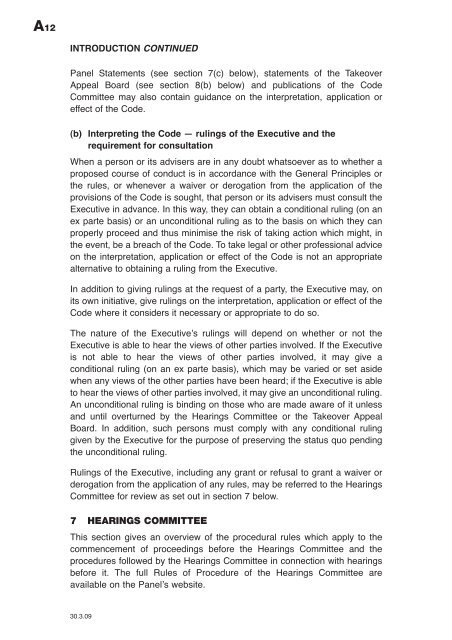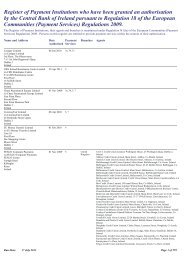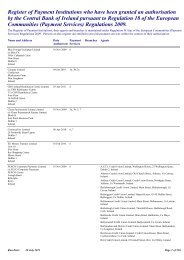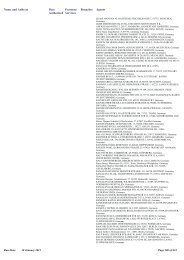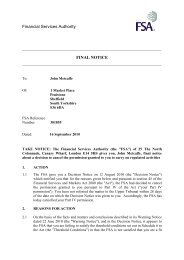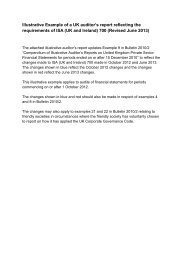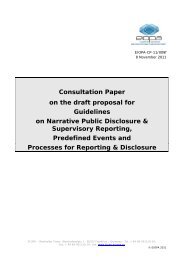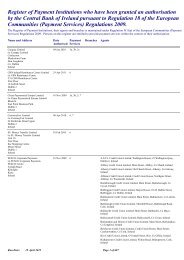The Takeover Code - Ninth edition - Better Regulation Ltd
The Takeover Code - Ninth edition - Better Regulation Ltd
The Takeover Code - Ninth edition - Better Regulation Ltd
Create successful ePaper yourself
Turn your PDF publications into a flip-book with our unique Google optimized e-Paper software.
A12<br />
INTRODUCTION CONTINUED<br />
Panel Statements (see section 7(c) below), statements of the <strong>Takeover</strong><br />
Appeal Board (see section 8(b) below) and publications of the <strong>Code</strong><br />
Committee may also contain guidance on the interpretation, application or<br />
effect of the <strong>Code</strong>.<br />
(b) Interpreting the <strong>Code</strong> — rulings of the Executive and the<br />
requirement for consultation<br />
When a person or its advisers are in any doubt whatsoever as to whether a<br />
proposed course of conduct is in accordance with the General Principles or<br />
the rules, or whenever a waiver or derogation from the application of the<br />
provisions of the <strong>Code</strong> is sought, that person or its advisers must consult the<br />
Executive in advance. In this way, they can obtain a conditional ruling (on an<br />
ex parte basis) or an unconditional ruling as to the basis on which they can<br />
properly proceed and thus minimise the risk of taking action which might, in<br />
the event, be a breach of the <strong>Code</strong>. To take legal or other professional advice<br />
on the interpretation, application or effect of the <strong>Code</strong> is not an appropriate<br />
alternative to obtaining a ruling from the Executive.<br />
In addition to giving rulings at the request of a party, the Executive may, on<br />
its own initiative, give rulings on the interpretation, application or effect of the<br />
<strong>Code</strong> where it considers it necessary or appropriate to do so.<br />
<strong>The</strong> nature of the Executiveʼs rulings will depend on whether or not the<br />
Executive is able to hear the views of other parties involved. If the Executive<br />
is not able to hear the views of other parties involved, it may give a<br />
conditional ruling (on an ex parte basis), which may be varied or set aside<br />
when any views of the other parties have been heard; if the Executive is able<br />
to hear the views of other parties involved, it may give an unconditional ruling.<br />
An unconditional ruling is binding on those who are made aware of it unless<br />
and until overturned by the Hearings Committee or the <strong>Takeover</strong> Appeal<br />
Board. In addition, such persons must comply with any conditional ruling<br />
given by the Executive for the purpose of preserving the status quo pending<br />
the unconditional ruling.<br />
Rulings of the Executive, including any grant or refusal to grant a waiver or<br />
derogation from the application of any rules, may be referred to the Hearings<br />
Committee for review as set out in section 7 below.<br />
7 HEARINGS COMMITTEE<br />
This section gives an overview of the procedural rules which apply to the<br />
commencement of proceedings before the Hearings Committee and the<br />
procedures followed by the Hearings Committee in connection with hearings<br />
before it. <strong>The</strong> full Rules of Procedure of the Hearings Committee are<br />
available on the Panelʼs website.<br />
30.3.09


